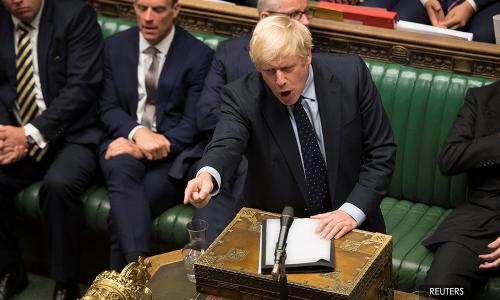How does UK PM Johnson call an early election?
British Prime Minister Boris Johnson said on Thursday he wanted to call an early general election to resolve deadlock in parliament over Brexit.
Johnson said he would ask parliament on Monday to approve a national election and wanted it to take place on Dec 12 as part of his efforts to ensure Britain leaves the European Union.
This would be Johnson’s third attempt to call an early election. He lost two similar votes in September because opponents said they wanted to first make sure Britain could not leave the EU without a deal.
Britain has laws setting out a fixed schedule for an election every five years, with provisions for holding an early election.
The next election is scheduled for 2022. How can one be called before then?
Two-thirds majority
An early election is possible under existing law if 434 lawmakers in Britain’s 650-seat parliament, a two-thirds majority, vote to hold one.
This is the route the government is pursuing next week.
Johnson has twice in the last two months failed to win enough support to trigger an early general election.
On Sept 4, the government fell short of the required majority when the motion was passed by 298-56 votes. Five days later, 293 lawmakers supported the motion and 46 members voted against.
One-line bill
Another way that Johnson can bypasses the legal restrictions around holding an early election is to is pass a one-line act of parliament.
This could state that parliament had decreed that an election will take place on a certain date, and would need to be approved by a simple majority of lawmakers.
But this procedure has problems. For example, opposition parties have indicated they may try to amend the legislation, perhaps by reducing the voting age.
No confidence
An election can also happen if opponents put down a motion of no confidence in the government and win a simple majority for it. This triggers a 14-day period during which others can seek to form a new government by a vote of confidence.
If no-one can show they have majority support in parliament, an election is called.
Because Johnson is himself arguing for an election, this route is not expected to be the trigger for a vote.
Who decides when the election is held?
Boris Johnson.
There are legal restrictions setting out a minimum period before an election can take place after it has been called, but not on the maximum period before one needs to be held.
What does the law say?
The law states there must be 25 working days between an election being formally called and polling day, which is traditionally a Thursday.
What are the obstacles to an early election?
Johnson will need cross-party support for an early poll. The main opposition Labour Party has so far refused to back an election while there is a risk of Britain leaving the European Union without an agreement.
Even if Jeremy Corbyn, the Labour leader, supports an election, there is a risk Labour lawmakers who fear losing their seats may ignore his instruction and vote against the motion.
- Reuters
RM12.50 / month
- Unlimited access to award-winning journalism
- Comment and share your opinions on all our articles
- Gift interesting stories to your friends
- Tax deductable

